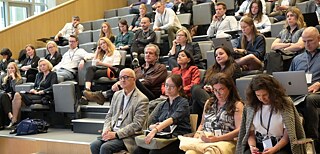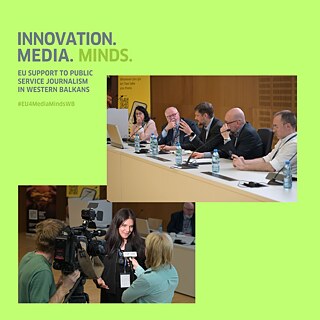From Bonn to Warsaw: How European Mobility
Strengthened My Media Practice
by Milorad Vujkov
At Deutsche Welle, I wasn’t just observing the mechanics of content creation, I was witnessing a living ecosystem where collaboration and innovation drive storytelling. The fast-paced environment showed me how mobile journalism and digital-first approaches meet audiences where they are, fostering real-time engagement that transcends traditional broadcasting.
What started as two distinct mobility activities—one hands-on editorial immersion, the other a deep dive into contemporary media discourse—has become a rich tapestry of insights. They have equipped me with practical skills in mobile journalism, content strategy, and audience engagement. More importantly, they have deepened my commitment to pushing IMM’s broader objectives: nurturing media innovation that bridges technology and human connection, enhancing intercultural dialogue, and empowering a new generation of storytellers to engage meaningfully with their communities.
Armed with these insights, I’m now working with my team to apply what I’ve learned: refining our storytelling strategies, championing digital formats, and creating content that not only informs—but inspires.
Funded by the European Union, the Innovation. Media. Minds Program: Support to Public Service Journalism in the Western Balkans, is managed by the Goethe-Institut on behalf of the European Commission and in collaboration with its implementing partner DW Akademie. The contents of this story are the sole responsibility of the author and do not necessarily reflect the views of the European Union.
“In every conversation and workshop, I was reminded that good media is about more than content—it’s about connection.”
Stepping into new spaces often reshapes how we see the world—and ourselves. This was the case for me in early 2025, when a series of mobility experiences took me from the editorial rooms of Deutsche Welle in Germany to vibrant conference halls in Poland. Each encounter, each conversation, revealed layers of media’s evolving role, deepening my understanding far beyond techniques and tools.At Deutsche Welle, I wasn’t just observing the mechanics of content creation, I was witnessing a living ecosystem where collaboration and innovation drive storytelling. The fast-paced environment showed me how mobile journalism and digital-first approaches meet audiences where they are, fostering real-time engagement that transcends traditional broadcasting.
“Transformation begins when we take the time to truly listen—both to audiences and to each other.”
Later, in Warsaw, amid the buzz of “Reinventing Management for Turbulent Times” and Content Warsaw 2025, the pulse of media transformation was palpable. Discussions on AI’s influence, the shifting behaviors of younger audiences, and the ethics of public service broadcasting weren’t abstract ideas—they were urgent questions shaping the future. Engaging with peers across Europe, I experienced firsthand how diverse perspectives catalyze innovation.“Stepping out of your comfort zone is where real learning begins.”
Navigating new cultural and professional landscapes challenged me to adapt, absorb, and grow in ways I hadn’t anticipated. These experiences align closely with IMM’s mission to foster media professionals who are agile, audience-centered, and ethically grounded—ready to lead change in a fast-evolving global media environment.What started as two distinct mobility activities—one hands-on editorial immersion, the other a deep dive into contemporary media discourse—has become a rich tapestry of insights. They have equipped me with practical skills in mobile journalism, content strategy, and audience engagement. More importantly, they have deepened my commitment to pushing IMM’s broader objectives: nurturing media innovation that bridges technology and human connection, enhancing intercultural dialogue, and empowering a new generation of storytellers to engage meaningfully with their communities.

“Growth isn’t just about new skills. It’s about new stories, new voices, and new possibilities.”
Funded by the European Union, the Innovation. Media. Minds Program: Support to Public Service Journalism in the Western Balkans, is managed by the Goethe-Institut on behalf of the European Commission and in collaboration with its implementing partner DW Akademie. The contents of this story are the sole responsibility of the author and do not necessarily reflect the views of the European Union.
